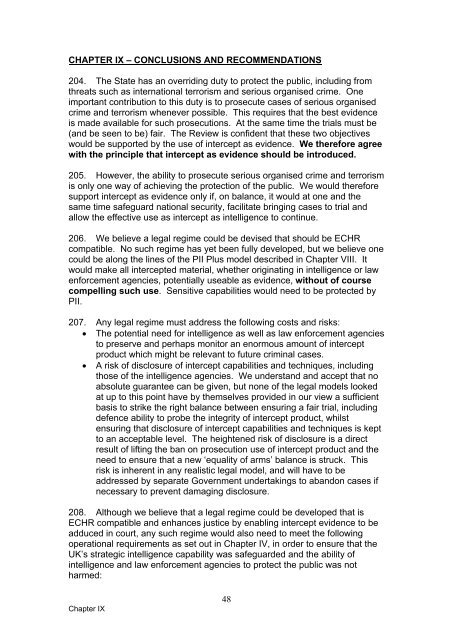Privy Council Review of intercept as evidence: report - Official ...
Privy Council Review of intercept as evidence: report - Official ...
Privy Council Review of intercept as evidence: report - Official ...
Create successful ePaper yourself
Turn your PDF publications into a flip-book with our unique Google optimized e-Paper software.
CHAPTER IX – CONCLUSIONS AND RECOMMENDATIONS<br />
204. The State h<strong>as</strong> an overriding duty to protect the public, including from<br />
threats such <strong>as</strong> international terrorism and serious organised crime. One<br />
important contribution to this duty is to prosecute c<strong>as</strong>es <strong>of</strong> serious organised<br />
crime and terrorism whenever possible. This requires that the best <strong>evidence</strong><br />
is made available for such prosecutions. At the same time the trials must be<br />
(and be seen to be) fair. The <strong>Review</strong> is confident that these two objectives<br />
would be supported by the use <strong>of</strong> <strong>intercept</strong> <strong>as</strong> <strong>evidence</strong>. We therefore agree<br />
with the principle that <strong>intercept</strong> <strong>as</strong> <strong>evidence</strong> should be introduced.<br />
205. However, the ability to prosecute serious organised crime and terrorism<br />
is only one way <strong>of</strong> achieving the protection <strong>of</strong> the public. We would therefore<br />
support <strong>intercept</strong> <strong>as</strong> <strong>evidence</strong> only if, on balance, it would at one and the<br />
same time safeguard national security, facilitate bringing c<strong>as</strong>es to trial and<br />
allow the effective use <strong>as</strong> <strong>intercept</strong> <strong>as</strong> intelligence to continue.<br />
206. We believe a legal regime could be devised that should be ECHR<br />
compatible. No such regime h<strong>as</strong> yet been fully developed, but we believe one<br />
could be along the lines <strong>of</strong> the PII Plus model described in Chapter VIII. It<br />
would make all <strong>intercept</strong>ed material, whether originating in intelligence or law<br />
enforcement agencies, potentially useable <strong>as</strong> <strong>evidence</strong>, without <strong>of</strong> course<br />
compelling such use. Sensitive capabilities would need to be protected by<br />
PII.<br />
207. Any legal regime must address the following costs and risks:<br />
The potential need for intelligence <strong>as</strong> well <strong>as</strong> law enforcement agencies<br />
to preserve and perhaps monitor an enormous amount <strong>of</strong> <strong>intercept</strong><br />
product which might be relevant to future criminal c<strong>as</strong>es.<br />
A risk <strong>of</strong> disclosure <strong>of</strong> <strong>intercept</strong> capabilities and techniques, including<br />
those <strong>of</strong> the intelligence agencies. We understand and accept that no<br />
absolute guarantee can be given, but none <strong>of</strong> the legal models looked<br />
at up to this point have by themselves provided in our view a sufficient<br />
b<strong>as</strong>is to strike the right balance between ensuring a fair trial, including<br />
defence ability to probe the integrity <strong>of</strong> <strong>intercept</strong> product, whilst<br />
ensuring that disclosure <strong>of</strong> <strong>intercept</strong> capabilities and techniques is kept<br />
to an acceptable level. The heightened risk <strong>of</strong> disclosure is a direct<br />
result <strong>of</strong> lifting the ban on prosecution use <strong>of</strong> <strong>intercept</strong> product and the<br />
need to ensure that a new ‘equality <strong>of</strong> arms’ balance is struck. This<br />
risk is inherent in any realistic legal model, and will have to be<br />
addressed by separate Government undertakings to abandon c<strong>as</strong>es if<br />
necessary to prevent damaging disclosure.<br />
208. Although we believe that a legal regime could be developed that is<br />
ECHR compatible and enhances justice by enabling <strong>intercept</strong> <strong>evidence</strong> to be<br />
adduced in court, any such regime would also need to meet the following<br />
operational requirements <strong>as</strong> set out in Chapter IV, in order to ensure that the<br />
UK’s strategic intelligence capability w<strong>as</strong> safeguarded and the ability <strong>of</strong><br />
intelligence and law enforcement agencies to protect the public w<strong>as</strong> not<br />
harmed:<br />
Chapter IX<br />
48
















